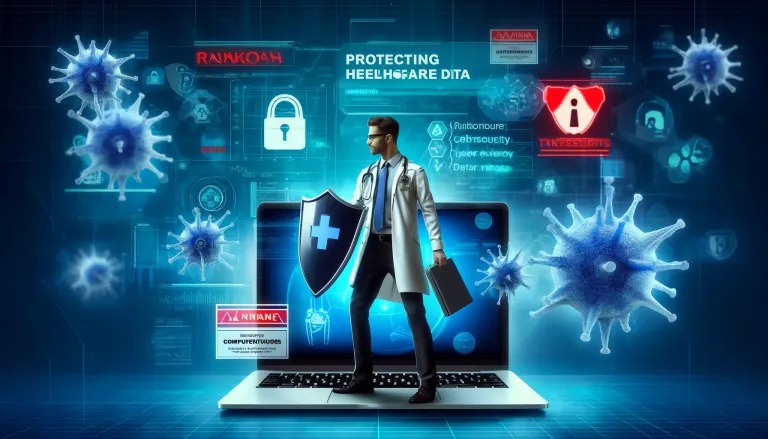Introduction to Healthcare Cybersecurity Challenges
Healthcare cybersecurity has become a critical issue as recent incidents have shown. The ransomware attack on Scripps Health in May 2021 compromised the personal data of 150,000 patients and crippled their operations. Hospitals had to resort to paper records, and emergency patients were diverted, resulting in financial losses totaling $112 million. Similarly, in February 2024, a ransomware attack on healthcare payment processor Change Healthcare disrupted payments nationwide, significantly impacting patient care and finances. These incidents underscore the urgent need for robust healthcare cybersecurity measures.
Understanding the Healthcare Cybersecurity Threat Landscape
The escalation of cyberattacks against healthcare providers is alarming. Ransomware in healthcare, in particular, has become a major threat, capable of blocking access to electronic patient records and essential medical equipment. These disruptions can lead to higher patient mortality and morbidity in otherwise treatable cases. The healthcare sector’s reliance on digital systems makes it a prime target for cybercriminals, who exploit vulnerabilities to extract ransoms or cause widespread disruption.
The Role of MSPs in Healthcare Cybersecurity
Managed Service Providers (MSPs) play a pivotal role in enhancing the cybersecurity posture of healthcare organizations. By leveraging specialized expertise and advanced technologies, MSPs can help healthcare providers proactively manage and mitigate cyber risks. Here are some key ways MSPs can support the healthcare sector:
- Comprehensive Healthcare Cybersecurity Solutions: MSPs offer a suite of security services, including advanced threat detection, endpoint protection, and network security. These solutions are designed to safeguard sensitive patient data and critical systems from cyber threats.
- 24/7 Monitoring and Incident Response: With round-the-clock monitoring, MSPs can quickly detect and respond to suspicious activities. This rapid response capability is crucial in minimizing the impact of cyberattacks and preventing further damage.
- Regular Security Audits and HIPAA Compliance: MSPs conduct regular security audits to identify vulnerabilities and ensure compliance with regulations such as HIPAA. This proactive approach helps healthcare organizations stay ahead of potential threats.
- Employee Training and Awareness in Healthcare Cybersecurity: Human error is a significant factor in many cyber incidents. MSPs provide comprehensive training programs to educate healthcare staff on best practices for cybersecurity, reducing the likelihood of successful phishing attacks and other exploits.
- Disaster Recovery and Business Continuity: In the event of a cyberattack, having a robust disaster recovery plan is essential. MSPs help healthcare providers develop and implement business continuity plans to ensure that operations can continue with minimal disruption.
Case Studies: Successful MSP Interventions in Healthcare Cybersecurity
- Scripps Health Ransomware Attack: Post-incident, Scripps Health partnered with an MSP to overhaul their cybersecurity strategy. The MSP implemented advanced threat detection and response systems, significantly improving Scripps Health’s ability to prevent and respond to future attacks.
- Change Healthcare Payment Processor Attack: Following the attack, Change Healthcare engaged an MSP to enhance their security infrastructure. The MSP provided continuous monitoring and incident response services, helping to restore normal operations swiftly and preventing further disruptions.
CloudByte Group’s Recommendations for Healthcare Providers to Enhance Cybersecurity
- Invest in MSP Services for Healthcare Cybersecurity: Partnering with a reputable MSP can provide healthcare organizations with the expertise and resources needed to strengthen their cybersecurity defenses.
- Adopt a Proactive Healthcare Cybersecurity Approach: Rather than reacting to incidents, healthcare providers should adopt a proactive cybersecurity strategy, focusing on prevention and early detection.
- Prioritize Employee Training in Healthcare Cybersecurity: Regular training and awareness programs are essential in mitigating human error and reducing the risk of successful cyberattacks.
- Ensure Compliance and Regular Security Audits: Staying compliant with regulations and conducting regular security audits can help identify and address vulnerabilities before they are exploited.
Conclusion: The Importance of Proactive Healthcare Cybersecurity
The recent surge in cyberattacks targeting the healthcare sector underscores the critical need for robust cybersecurity measures. By partnering with Managed Service Providers like CloudByte Group, healthcare organizations can enhance their security posture, protect patient data, and ensure the continuity of care. Proactive cybersecurity is not just a necessity—it’s a strategic imperative for the health and safety of patients and the overall resilience of the healthcare sector.
At CloudByte Group, we specialize in providing comprehensive cybersecurity solutions tailored to the unique needs of healthcare providers. Contact us today to learn how we can help secure your operations and support your mission of delivering exceptional patient care.
Ready to elevate your cybersecurity strategy?
Contact us for a free consultation and discover how our expert services can protect your healthcare organization from cyber threats, without breaking the bank.

.png)
.png)